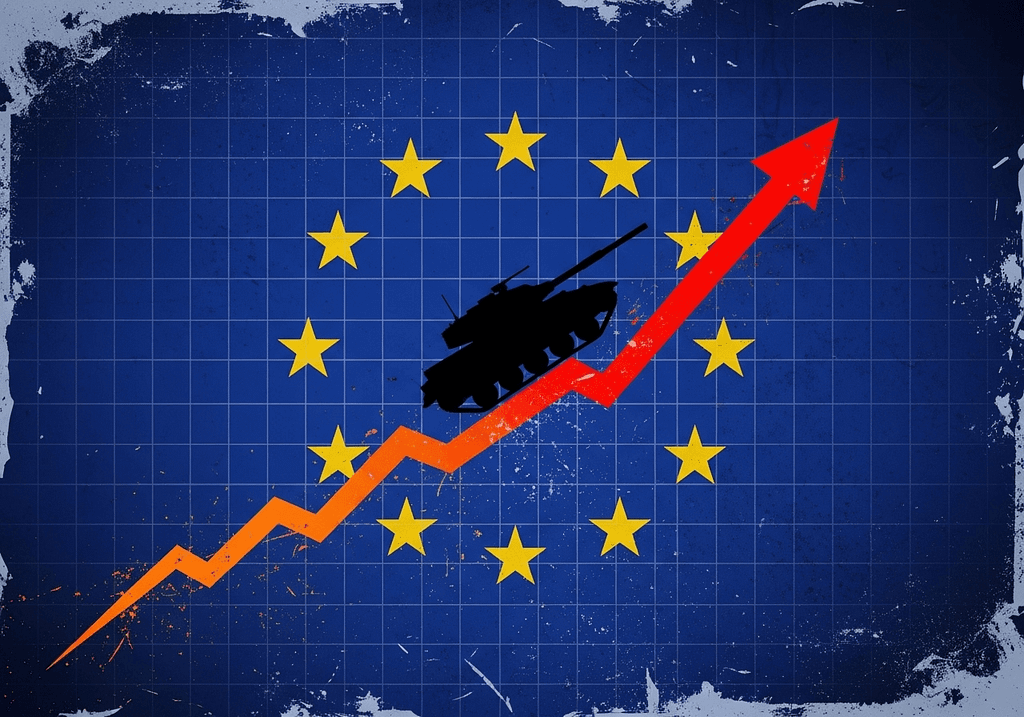Bank of America considers European defense companies attractive with further growth potential at a time when the defense sector is experiencing an unprecedented wave of orders. What drives this boom in European defense companies and how will NATO’s new commitment to invest 5% of GDP in defense fundamentally change the investment environment? The answer lies in a combination of geopolitical pressures and specific political decisions that are already rewriting the financial results of European defense firms.
NATO Summit in The Hague Launched New Era of Defense Investment and Military Spending
The NATO Summit in The Hague in June 2025 set a historically ambitious target of 5% of GDP annually for defense by 2035. The defense budget structure includes at least 3.5% for core military needs and up to 1.5% for broader defense items including infrastructure and cybersecurity.
This political signal represents a key change for European military technology manufacturers, as government commitments facilitate planning of large framework contracts for decades ahead. For comparison – current defense spending by most European countries ranges between 2-3% of GDP, meaning potential doubling of the defense market. Global military expenditure already reached a record $2.718 trillion in 2024 with year-on-year growth of 9.4%, with all 32 NATO members increasing their military spending.
European Defense Companies Report Historic Backlogs for First Half 2025
The impact of NATO’s decision immediately showed in the financial results of the largest European defense companies, creating a new investment theme for the coming years. British BAE Systems achieved first-half 2025 revenue of £14.6 billion with adjusted operating income of £1.55 billion and backlog (orders pending fulfillment) of £75.4 billion. German Rheinmetall recorded revenue of €4.735 billion with a record backlog of €63 billion.
Both companies confirmed growth across all defense segments. BAE Systems reported year-on-year revenue growth of 11% with order intake of £13.2 billion. Rheinmetall showed even stronger dynamics with 24% revenue growth and defense segment growth of more than one-third. Both firms revised their full-year outlooks upward as a response to growing demand for investment in the European defense sector, signaling a long-term structural shift in the industry.
Investment in European Defense Companies Attracts French and Italian Groups
French Thales reported revenue of €10.3 billion for the first half of 2025 with adjusted operating income of €1.25 billion, with management raising guidance based on visibility of new contracts. The company increased its growth estimate for 2025 in connection with increased demand for defense systems and military technology.
Italian Leonardo recorded significant growth in defense segments with specific delivery volumes including F-35 wings and increased helicopter production. Even companies with larger civilian focus benefit from the trend – Rolls-Royce raised full-year guidance with adjusted operating income of £1.7 billion for H1 2025 thanks to after-sales services and service contracts.
European Defense Sector Driven by Scandinavian Companies
The positive trend of investment in the European defense industry is not limited to the largest European players. Swedish Saab reported year-on-year revenue growth of 30% to 19.786 million SEK in Q2 2025 with backlog exceeding 197.5 billion SEK. The company adjusted its organic growth outlook upward due to rising demand. Norwegian KONGSBERG reports year-on-year operating revenue growth of 20% in the defense segment.
- KONGSBERG announced a joint venture 50:50 with French Thales for a secure communication division in Norway
- Swedish Saab raised full-year outlook for organic revenue
- Both companies benefit from rising defense budgets in Northern Europe
These results illustrate how smaller European defense companies are expanding due to increased demand for advanced defense technologies and growing investment in cybersecurity within the broader trend of European defense industry growth.
European Institutions Mobilize Capital for Defense Industry
To finance this massive growth, new financial mechanisms are emerging that could significantly accelerate sector expansion. The planned Defence, Security and Resilience Bank has gained support from major commercial banks with the ambition to help governments access large capital without immediate increase in national debt.
The European Investment Bank expanded its intervention capability in defense industry. The EU launched the ASAP program with allocation of €500 million for rapid increase in ammunition production capacity with the goal to significantly boost European production by 2025. These programs have already supported specific investments in expanding production capacities across Europe.
Ammunition Production Addresses Critical Bottlenecks in European Market
Current capacity limitations in ammunition production have been identified as a key factor limiting growth, but also represent a clear investment opportunity for specialized manufacturers. The EU ASAP program has already supported investments in expanding production capacities, including public subsidies for key manufacturers. Rheinmetall is building large capacity projects including new ammunition plants.
Satellite analyses confirm extensive construction of new production facilities for defense manufacturing across Europe since 2022. The goal to significantly increase European ammunition production capacity by 2025 is reflected in rapid investments in ammunition plants. Analysts monitor how quickly European manufacturers can scale production for growing demand driven by NATO commitments, with production bottlenecks gradually becoming investment opportunities.




